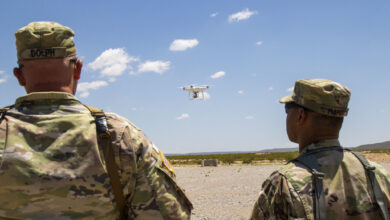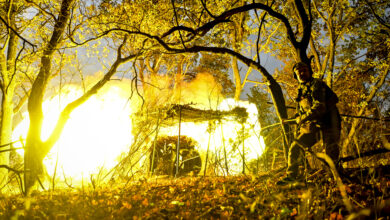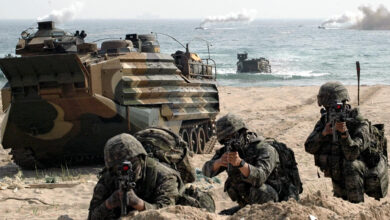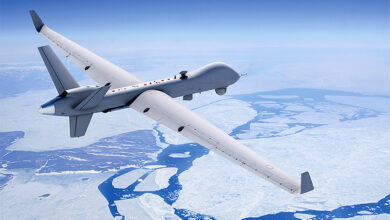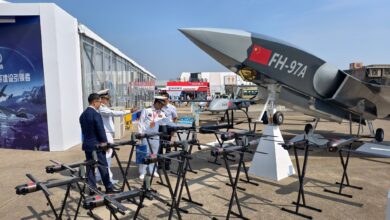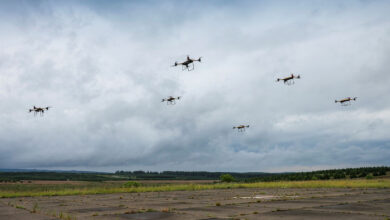Hashd al-Shaabi ammunition cache explodes in Iraq, fourth in recent months
A “materiel stockpile” belonging to an Iran-linked militia exploded at a northern Iraqi air base, the head of Iraq’s Civil Defense said on Tuesday.
Major General Kazem Salman Bohan told Iraq’s al-Sumeriyya TV on August 20 that the explosion occurred at a Hashd al-Shaabi (Popular Mobilization Units) headquarters adjacent to Iraq’s Balad Air Base in Salahuddin province.
The incident was the fourth similar explosion at facilities belonging to Iran-backed militias in Iraq in the past two months.
Explosions shook southern Baghdad last week when a Hashd al-Shaabi munitions depot detonated inside Camp Falcon (Saqr), an Iraqi Federal Police facility, leading Iraqi lawmakers to demand that munitions stockpiles be removed from urban areas.
Reuters cited an Iraqi security source as saying the warehouse stored short-range and Katyusha rockets.
Iraqi officials initially blamed poor ordnance storage techniques and soaring temperatures in the capital for the detonation, which killed one person and wounded 29 others.
A preliminary Iraqi government inquiry later suggested an airstrike may have been the cause, leading Prime Minister Adil Abdul Mahdi to issue a decree ordering all military flights over Iraqi airspace to be treated as hostile unless approved by him.
The U.S.-led Coalition to defeat ISIS in Iraq and Syria said on Friday that it “immediately complied” with the prime minister’s order, and Coalition aircraft have continued to conduct strikes against ISIS since, an Iraqi military spokesperson said.
On July 28, Al-Arabiya reported that an explosion at Camp Ashraf killed a number of Hezbollah fighters.
In June, the Iraqi Army said an unidentified drone bombed a Hashd al-Shaabi base in Salahuddin province. The U.S.-led Coalition denied responsibility for that incident.
The explosions have led some Iraqi lawmakers to allege that U.S. or Israeli airstrikes may be behind the blasts.
A U.S. military spokesperson could not be immediately reached for comment. Israeli officials have not addressed the incidents directly.
Asked about the explosions in Iraq during a meeting with reporters in Kiev on Monday, Israeli Prime Minister Benjamin Netanyahu said, Iran-backed forces are “not immune anywhere.”
“We will act — and currently are acting — against them, wherever it is necessary,” Netanyahu said, echoing similar statements made last year by then-Israeli Defense Minister Avigdor Lieberman.
Israeli aircraft have struck Iran-linked militias in Syria repeatedly in recent years in coordination with the U.S.
Several of Iraq’s Hashd al-Shaabi militias are supported by Iran’s Revolutionary Guard Corps, and many have a presence in eastern Syria.
Washington has accused the militias of moving missile systems into Syria via Iraq for use against Israel.
The American envoy to the Coalition James Jeffrey said in May that the U.S. was supporting the Israeli strikes against Iran-linked targets in Syria “one thousand percent,” but said that support was “not official.”
Reuters cited Iranian officials last year as saying the transfer of Iranian ballistic missile transfers into Iraq were intended as a deterrence to any possible American or Israeli attack on Iran.
The Iraqi government has been working to bring the mostly-Shia militias under its centralized control. The militias, organized in 2014 to fight Islamic State’s takeover of much of Iraq’s northwest, have monopolized significant energy resources and smuggling routes in the country.
A commander of the Iran-linked Harakat Hezbollah al-Nujaba militia said last week that the Iraqi Army should be dissolved and the PMU should be made the primary security force of the state.



